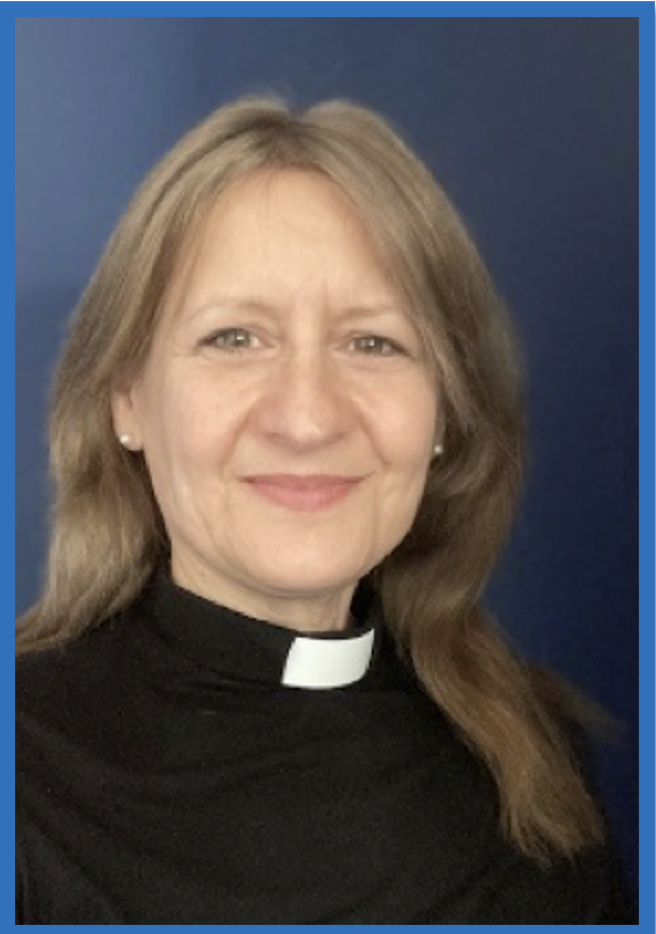Towards a Radical Theory of Lay Ministry
‘Towards a radical theology of lay ministry’

The Rev’d Canon Dr. Hayley Matthews
Director of Lay Training, Diocese of Leeds
Hayley is Principal of Leeds School of Ministry. She leads a Lay Training Team delivering Licensed Lay Ministry training under Common Awards. The wider team deliver a range of Lay Training Pathways using a variety of delivery models online and off. Hayley envisioned and developed the Diocesan Digital Learning Platform, a custom built programme specifically for Christian Discipleship and lay vocation, including the sharing of learning resources across Dioceses to allow the laity direct access to vocational training and discipleship materials. She also helped develop the ‘Diocesan Rhythm of Life’ to enable laity and clergy to deepen their spirituality and discipleship through a gentle rule, and has written a number of Seasonal Courses to sustain and support this.
Having been in lay leadership for over two decades, I clearly recall the moment I reverenced the altar, glanced up at Jesus wrought in stunning stained glass and turned to walk towards my stool. Be-robed, cope and all, I turned to see two hundred+ laity in the congregation before me, Servers to left and right, vergers standing stall, all eyes on me as I took my first steps towards inhabiting my priesthood. The words ‘this is what I was born to do’ appeared in my mind like a ray of sunshine through a steel-grey sky. Just as quickly, I was unexpectedly flooded with a sense of God’s Spirit and I had an almost ominous sense that all are called towards ‘this point’ of commitment in our discipleship which shifted the focus from all eyes on me, to my eyes on all of them. Certain that we aren’t all called to ordination, but equally bemused by the experience, in those five long meters between altar and nave I had come to the fullness of entering my priesthood along with a blinding revelation that all laity should reach the point of knowing the fullness of their own vocations in Christ. Every baptised Christian should reach pivotal moments of discipleship that required as full a commitment, dedication and public affirmation as those surrendering to the priesthood, each equally celebrated by the Church.
Seminal as this moment may have been juxtaposed as it was sacramentally, the origins of this blossoming tree took root decades before in a parish Church serving an extremely deprived Blackpool Parish where the strapline was ‘the Church of the people’. Our parishioners were neither educated nor vying for a place on the PCC, let alone Reader training, as it was then, yet the place was alive with lay ministry. Lay Leaders arose under the supervision of the incumbent, and it was the Lay Leaders, not the clergy, who taught and trained us up in all things biblical, liturgical and pastoral, while sermon after sermon focussed on us knowing who we were in Christ Jesus, hand-in-hand with the journey of discerning were we each were called to serve in Christ’s body.
This was not mere lip service, however, we practised what was preached. The culture of the Church was ‘bottom-up’ not top-down, the clergy energising and leading people on in their vocations through an overarching vision, mentoring, even a not-so-gentle steer on occasion, but we – we were the Church. We led the services, chose the worship, trained the pastoral care team, wrote the intercessions, trained the signers, visited the sick, developed new accessible services for after school, and late Sunday evening services for our young adults. More mature laity ran a mid-week lunch club for over fifty elderly people, which could have been mistaken for any high quality café in town.
The 98%[i] were visibly serving their communities and serving the church, the caveat being that when I was promoted to a more senior role at work and needed to step back, the clergy very definitely felt that I was choosing not to serve, prioritising secular employment (I worked in an Local Education Authority). The words ‘lacking commitment’ were attributed to having less time to get involved in Church activities. Try as I might to explain that in being an exceptionally committed employee, going above and beyond with good grace, and having countless pastoral conversations in the kitchen, I was witnessing to my faith and my God in the workplace, we laity were ministering on behalf of the church in order to grow the church and anything outside of ‘the church’ was considered to be either self-serving or a distraction from the main event.
In ‘Towards the Conversion of England’ (1946)[ii] Archbishop William Temple was adamant that evangelism had been hamstrung by our inability to ‘use the opportunities for evangelism daily afforded by their various professions, crafts and occupations’ (ibid. p.58, paragraph 130) which prompted the Church of England’s Setting God’s People Free (SGPF) report (GS2056, 2017)[iii] to suggest that the Church needs to ‘form and equip lay people to follow Jesus confidently in every sphere of life’ as a matter of urgency.
The SGPF Report adds that an undergirding significant cultural shift is needed to make this happen:
‘until laity and clergy are convinced, based on their baptismal mutuality, that they are equal in worth and status, complementary in gifting and vocation, mutually accountable in discipleship, and equal partners in mission, we will never form Christian communities that can evangelise the nation.’ (ibid. p3.)
There are two distinct issues being raised here. First, evangelism, often the mere utterance of this word this has precipitated one of two responses: first, the ‘in-your-face Christian’, evangelising with little appreciation of context or audience creating quite the opposite of the intended effect; second, the unholy fear that one might be expected to do the first. In fact, Jesus’ example of evangelism is so profoundly relational we learn that primarily we need only become confident Christians. It is in discipling ourselves (as well as others) that our faith is evident throughout our daily lives, in our work places, through our engagement in sporting and artistic circles, or community work. Faith can be evidenced through our values and ethical integrity, perhaps, but more importantly through the grace, mercy, and lovingkindness we show to all, and to the peaceful way in which we live out our faith with one another, let alone people of all faiths and none. Rather than relying on an academic knowledge of the Dead Sea Scrolls, we become those living scrolls through which God promised His Law would be written on our hearts (Ezekiel 36:26; Jeremiah 31:33; Hebrews 8:10). I rather like this analogy coming from Blackpool Parish, and think of our faith being writ through us like the word ‘Blackpool’ is through rock. ‘Taste and see that the Lord is good’!
Yet we mustn’t write off our extroverted evangelists altogether. John’s gospel opens with John the Baptist making Jesus known by calling all people to repentance (type 1), while Philip and Andrew are inherently relational (type 2), speaking to their brothers about Jesus, first and foremost. Now, much as John brought many to repentance in readiness for Christ, he was also beheaded, which is fair warning. Some may need to be shouted at through a loud hailer before God’s Spirit can be heard above the din of cynicism and derision, but on the whole, people are walking past, privately beheading you and cutting themselves off ever further from the very gospel that will bring them life. Evangelism so often occurs naturally between people with pre-existing relationships, that it is vital that we are encouraged to engage as Christians much more professionally and socially if we are to share the Good News of Jesus Christ. Salt in a cellar does not taste good; sprinkled liberally it brings out the goodness in all it touches – and preserves as it should. This is the essence of Lay Ministry, to bring the Gospel to wherever we are sprinkled by being the Good News wherever we are place.
This is the Church without walls to which we have been called to create; each of us a Living Stone (1 Peter 2:4-6); each of us temples of the Holy Spirit (1 Corinthians 6:19). Thus it is vitally important to develop a solid foundation for our faith internally if we are to express it externally, but equally important that we are then discipled into a confident grasp of the Gospel, so that we can have those awkward conversations over the water cooler about why someone’s parent is suffering so as their life nears its end, or how God can let their colleague’s child succumb to cancer. These conversations are not for the chosen few, they are for us all, wherever we are carried by God’s Spirit. For lay ministry is not primarily about being upskilled to take on tasks for which there are too few clergy, or to keep the many cogs of the Church turning so that service remains as we like it. The entire point of lay ministry is that disciples make disciples, through service to their communities, exemplary work ethics, pastoral care, lunchtime conversations about where we went last weekend, seasons of invitation and kindly cards of condolence – nothing ground breaking at all, in fact, just the gentle lapping of a love that will not let us go[iv].
However, what is ground breaking, is the second issue being raised here, which is the mutuality of lay and ordained ministries, birthed in baptism and the ways in which we enable the laity to achieve such confidence. Long gone are the days where we relied on clergy getting a nudge from the Spirit on behalf of the laity – ‘Doris, you always look so beautifully turned out, and seem to be about the only person I know who still uses starch. The linen would really benefit from your touch’ – ‘have you thought about children’s work? No? But you’re quite wonderful with your three, and all under five, too! You could simply be with them at the back of Church and include the other children. Why don’t you ask one or two of the other Mums to help you?’ Caricature? Maybe. This is not lay ministry, it is volunteering, pepper to our salt, scaffolding to our Temple. Much less volunteering is actually needed when Lay Ministry is fully developed, for as we all exercise our many and varied vocations, forming natural teams together, the need for volunteers to get stuck into a task for which they are not equipped dissipates. A cultural shift in our language may help to precipitate what is essentially a theologically undergirded move from ‘filling the slots’ to ‘fulfilling my God-given calling’ whether within or beyond the physical Church walls.
The New Testament is sometimes inaccurately read as recording lay ministry as derivative from real leadership; the apostles need to delegate the distribution of food to new ‘elders’ in order to get on with the all-important work of the sharing the Gospel. What we don’t read, from this distance, is that the Hellenists were complaining that the Jewish leaders were so focussed on feeding their own (well-known) community that the Hellenists were being left out. As a result, Hellenists were duly included in the leadership, and as a consequence, the distribution of food to their own widows (Acts 6:1-6). The passage continues, ‘So, the word of God spread’ [emphases mine]. The number of disciples in Jerusalem increased rapidly, and a large number of priests became obedient to the faith,’ (Acts 6:7). SO the word of God spread – as a direct result of wider inclusion of the laity in the leadership whereby various groups of disciples were able to reach their own communities in loving service, the gospel flourished, and not only did it flourish, but here we see the laity converting the priests to true religion, i.e. to feed those in need, in Christ’s name. It is also worth reflecting on the call back to our own communities – we see this with the demoniac, the leper, and the woman at the well. Much as they wanted to follow Jesus (into a religious setting), instead He sends them back – to their ownpeople – this in itself resonates with those early disciples in John’s Gospel who spread the gospel beginning with their very own siblings. Another reason this is vitally important is the way in which we have coined the phrase ‘believing, belonging and behaving’ to mean ‘be like us’. Converts returning to their own communities may change values, but identities, vitality important to remember as we seek to share the Good News to recognise that our version of heaven is another’s hell.
To reiterate point two, all are called. We are familiar with the concept of the priesthood of all believers, reiterating the change from religious hierarchy or inclusion/exclusion to a flattened, all-embracing structure:
As you come to him, the living Stone—rejected by humans but chosen by God and precious to him—you also, like living stones, are being built into a spiritual house a to be a holy priesthood, offering spiritual sacrifices acceptable to God through Jesus Christ. (1 Peter 2:4-5)
Inadvertently, we have built brick houses (churches) into which we have piled living stones that struggle to find where they fit when most of the options for vocation involve either ministering to ourselves, or to those who come to us, or are loosely affiliated with us. To use another biblical analogy, we are trying to contain and package a Kingdom that we might hand it out piecemeal when it should be growing as exponentially as yeast within dough, repeatedly outgrowing its container, through first and second proving. Had we recognised the Living Stones as the Church, we might have recognised that, although at times comfortable and collegial, storing them in brick buildings has shrunk the power and reach of the Church, of the gospel, and potentially even of the Kingdom. I have met more than one Muslim converted through visions of Christ whilst praying the Salah. People of all faiths and none are met by Him in their dreams both here and around the world. Is this perhaps because we are no longer ‘free-range Christians’? Are we penned in by the very Church we are called to be not to build, meaning we are not alongside the very people that Jesus seeks because we are now so limited in our reach? Anything that seeks to replicate itself through battery farming is surely doomed to failure?
Has the Church been hamstrung by our inability to think beyond the small, safe, often beautiful containers that are neatly labelled so that people are very clear about the medicine within and how often they should take it and how? The prescriptiveness of our Church lives (believe, belong, behave) may as well just be ‘behave, or you can forget the rest’) has oft enculturated us into pious pedants with a penchant for prying – all that Jesus sought to challenge with our mis-reading of the Abrahamic texts and the creation of the Pharisees – are we now becoming Pharisaic, blinded to our own peccadillos at the expense of those who have never yet heard the Good News?
Confident Christians, laity, with an assured sense of their being children of God through Jesus Christ, secure in their understanding of our faith, need not be limited to ‘the work of the Church’. It is entirely plausible that Licensed Lay Ministers, with their threefold ministry of teachers and preachers of the faith; enablers of mission; and leaders in Church and Society work entirely beyond the walls of a Church that is holding the Gospel in very splendid isolation, in many places. The priesthood of all believers reveals the sacramentality of all Christian life; not simply the sacrament of the present moment, although we would do well to base all our words and actions on that premise. We are endowed with the light of Christ at Baptism, being immediately charged with taking it out into all the world:
You have received the light of Christ;
walk in this light all the days of your life.
All Shine as a light in the world,
to the glory of God the Father.
Many of the laity have eschewed the Church altogether, and may now be living their best life, carrying the light of Christ into each and every one of their ‘worlds’ but without the confidence or language to share the Good News with others. We might learn much from those who have dared to leave the safety of world where everything is set in stone to bring God’s Kingdom in many and varied ways in their own communities – we should embrace that learning they may return us to ourselves.
This move of the Spirit is impacting all major denominations as we all return to our baptismal call. In this model, Church becomes the place where we worship together, and discern God’s call for us as a community, in smaller teams and as individuals. We need to not just understand but celebrate the Christian callings we live out beyond the church in the realms of home (parenting/spousal relationships), through missionaries, schools, broadcast media, the NHS, homeless shelters and all other forms of parochial outreach ministries taking place. Notably, lifting the laity to an equitable rank to the clergy, in that the laity are the Church, not that they attend or are members of it is central to shifting culture from volunteer to vocation. Thus should laity be medics, teachers, post-office counter workers, bus drivers or opera singers, they are the Church wherever they are, making Christ visible and present in those places. This fully resonates with the changes taking place in the Monday to Saturday[v] culture shift within the Church of England – a move from going to Church, to being the Church. This is one job that the clergy cannot do, with or without a rota.
Hayley Matthews, Advent 2022
___________________________________________________________________________________
[i] Setting God’s People Free report
[ii] Chavasse, C. M. (1946). Towards the Conversion of England: The Clergy and Evangelism. The Expository Times, 57(9), 228–233.
[iii] GS 2056 “Setting God’s People Free” (2017). A Report from the Archbishops’ Council.
[iv] Hymn: O love that wilt not let me go, (1881). George Matheson.
[v] https://www.churchofengland.org/sites/default/files/2018-02/Setting%20God%27s%20People%20Free%20for%20Monday%20to%20Saturday%20report%20A4%20final%20Feb%202018%20%28005%29.pdf





